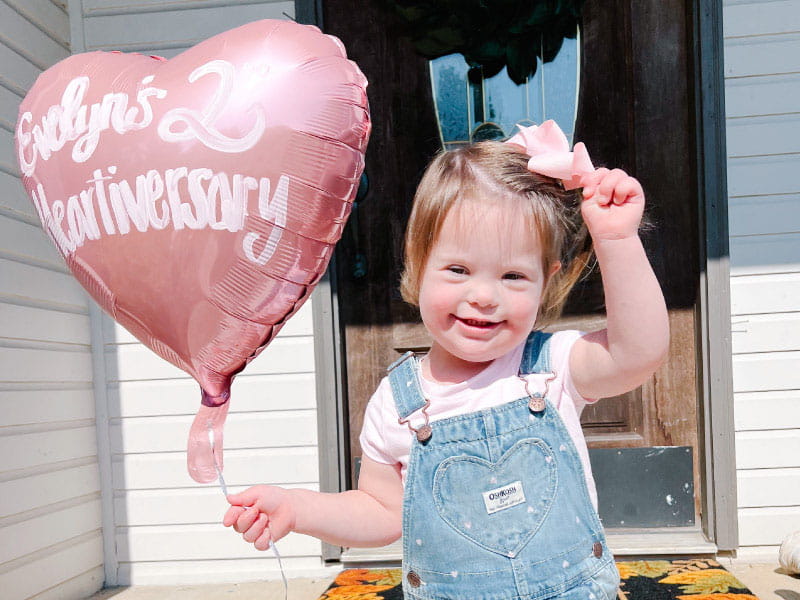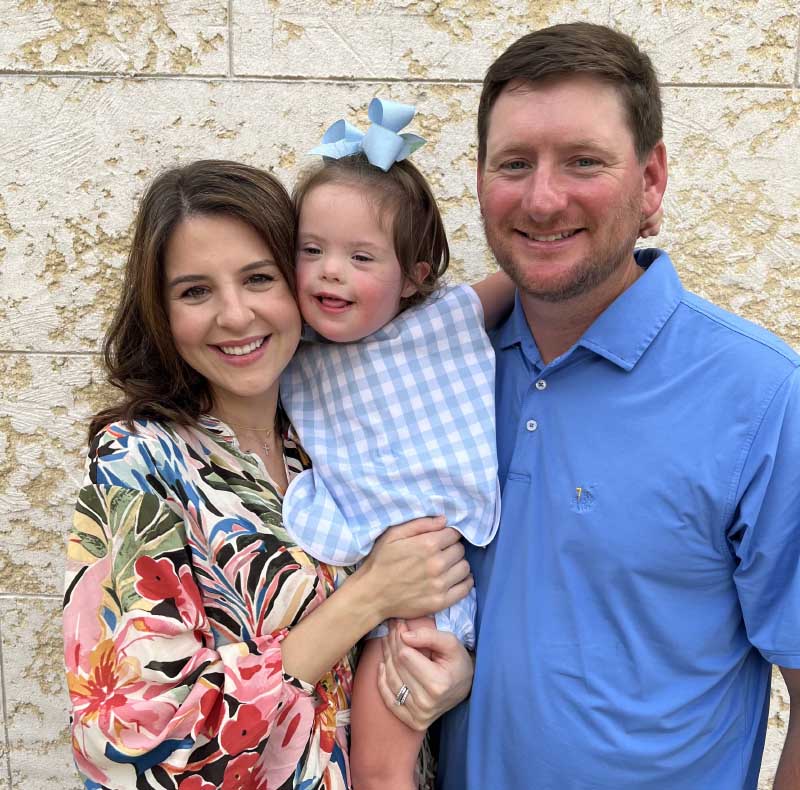Modern medicine is changing the prognosis for kids with Down syndrome and heart defects
By Laura Williamson, American Heart Association News

Evelyn Hamm was born with a hole in the middle of her heart. But her parents and her doctors expected it.
During her 20-week anatomy scan, doctors detected the congenital heart condition, an atrioventricular septal defect. While uncommon, the defect is very common among children born with another condition – Trisomy 21, also known as Down syndrome. So common, in fact, it was the presence of this defect that alerted doctors to Evelyn's extra chromosome.
"We did not do prenatal genetic testing," said Rachel Hamm, who was in her late 20s when she became pregnant with Evelyn, her first child. Initially, the news that her baby was facing two serious health conditions "was overwhelming."
But during the last few months of her pregnancy, Rachel and her team of doctors had two things families of children with Down syndrome did not have decades ago: time to prepare, and a wealth of knowledge about how to treat conditions that once signaled an early death.
Advances in cardiac treatment and care over the past several decades have led to greatly improved long-term survival rates for children born with heart defects – including those with Down syndrome.
"Prenatal testing has allowed us to diagnose genetic syndromes and congenital heart defects sooner so that we can treat them sooner," said Dr. Shaun Setty, medical director of pediatric and adult congenital cardiac surgery at Miller's Children's Hospital and Long Beach Memorial Medical Center in Long Beach, California. Setty co-authored a recently published American Heart Association scientific statement on congenital heart defects in children with Trisomy 21.
"We're now operating on smaller and smaller babies," he said. "In the past, we would wait until the baby was a certain size before we would perform surgery. We now know we want to operate on them sooner because the patients will have better longevity and outcomes."
Evelyn had open-heart surgery to repair the hole just four months after she was born. Three years later, her heart is doing great – and so is she, her mother said. Doctors told Rachel that Evelyn's future is "really up to her. She does not have to sit out of sports. She gets to be a typical kid and do whatever she wants to do."
Children born with Trisomy 21 have an extra copy of chromosome 21, which changes how their bodies and brains develop. About 1 in 800 children are born with Down syndrome in the U.S. each year, according to the AHA report. Up to half of them have some type of congenital heart defect, along with significant physical, neurodevelopmental, psychosocial and functional conditions that can further complicate their health and quality of life.
There are a wide variety of heart defects that affect children with Down syndrome, but most are either a hole or holes in the heart like Evelyn had. Others may have some type of abnormal heart valve, Setty said. For example, instead of two valves connecting the upper and lower chambers of the heart, there may be one common valve.
"In atrioventricular septal defects, the inside of the heart doesn't form correctly," he said. "We know there is a correlation between Trisomy 21 and the genetic mechanisms of how hearts are formed. What we don't have figured out are the exact mechanisms. The more we look into it, the more complex it is."
Treating children with Down syndrome for the myriad conditions that affect them often involves another level of complexity: negotiating the health care system to find all the specialists they might need. Children with Down syndrome and congenital heart defects may have gastrointestinal, respiratory or neurologic issues, along with endocrine disorders such as diabetes or thyroid dysfunction. They also may have blood disorders, certain types of cancer and vision or hearing issues.
Medical care centers specifically for people with Down syndrome are starting to emerge across the country. They allow families to get all the care they need in one place, saving time, stress and money.
"It not only relieves stress for families, but allows for a whole patient evaluation," Setty said. "Having an integrated system of care allows children to be seen earlier and ensures the correct specialist will see them at the right time. When a family has to navigate all of this on their own, it makes it very difficult. When care is coordinated, it also allows specialists to talk to each other so they can make sure things are not missed."
No such center exists near Helena, Alabama, where Rachel and Blair Hamm are raising Evelyn, who is now 3. Even before Evelyn was born, Rachel began researching medical options, switching hospital systems and spending hours speaking to Evelyn's pediatrician about what to expect.
"I was her center of care," Rachel said. "I was her coordinator."
In addition to the heart defect, Evelyn developed pulmonary hypertension, or high blood pressure in the lungs, which has since resolved. This condition affects up to about half of children with Down syndrome and heart defects. She also has an underactive thyroid, which her mother said is easily managed.
"She's an otherwise healthy little girl. We're very thankful for that," Rachel said.

But other children with her condition aren't so lucky, and Rachel has made it her mission to advocate for them, as well as for her daughter. She sits on a steering committee working to bring a Down syndrome medical center to nearby Birmingham and is president of the Junior Board of Directors for Down Syndrome Alabama.
While enormous progress has been made in how children with Down syndrome are treated, Rachel said there needs to be a broader understanding of the condition across medical professionals, in particular when delivering a diagnosis to families.
"Down Syndrome Alabama works to help physicians deliver a compassionate diagnosis," she said. "I was not given a compassionate diagnosis. The way I was spoken to, they were putting limitations on Evelyn before she was even born. Physicians need to understand that these children are people. They are more than just a diagnosis."





